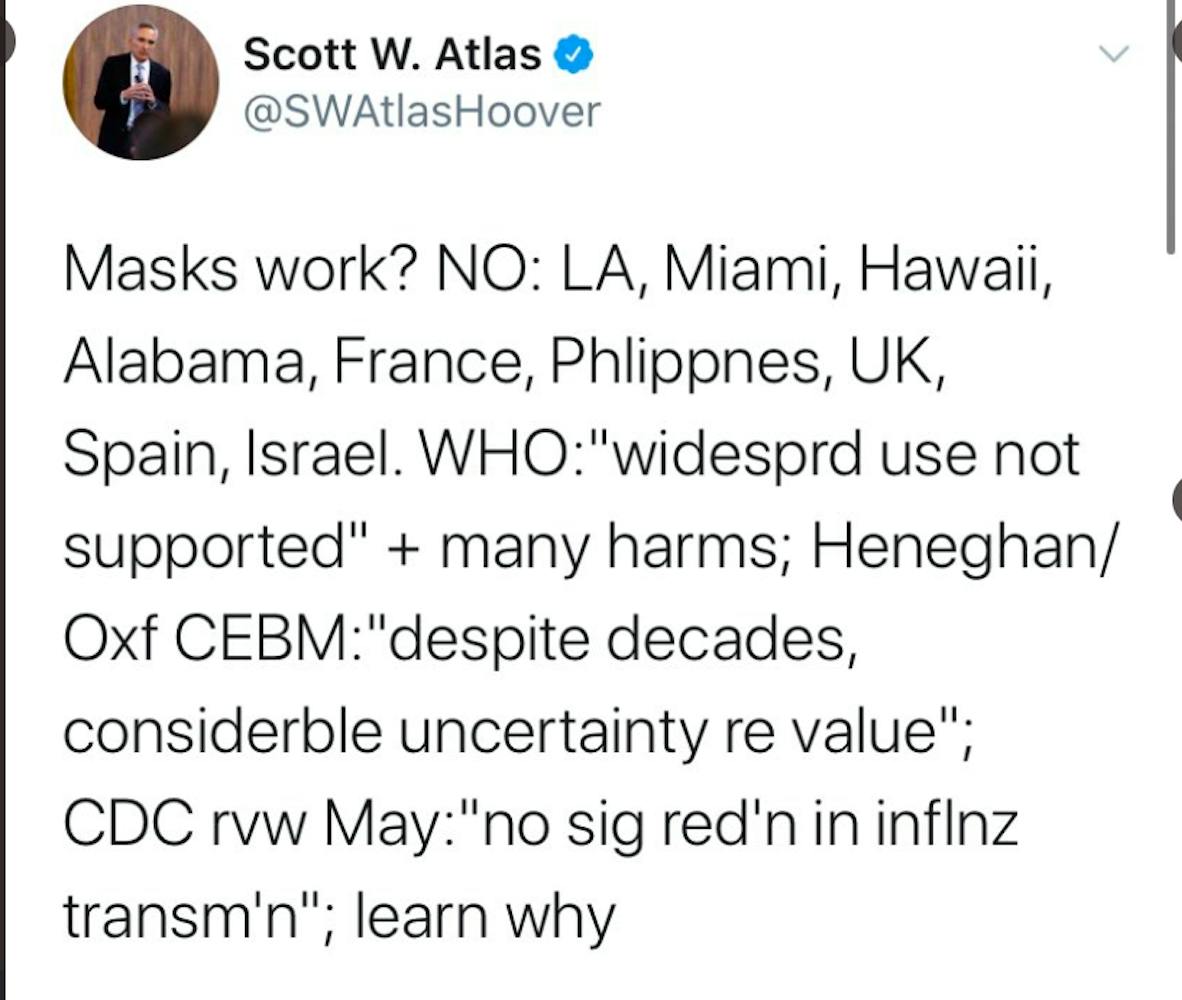THE CLAIM: On Oct. 17, 2020, Dr. Scott Atlas, a White House medical advisor, tweeted the claim that masks were ineffective to over 87,000 followers, citing the CDC and the WHO among his sources. He included a link to an article about mask-wearing published by the conservative think-tank American Institute for Economic Research. The tweet was soon taken down by Twitter as part of their policy to prohibit posts spreading false claims about COVID-19.
In a phone interview with KUSI news, Atlas explained that the evidence in his tweet showed how widespread use of masks is ineffective.
In a follow-up tweet, Atlas said that he supported wearing masks where social distancing wasn’t possible and around people at high-risk for COVID-19, per President Donald Trump’s own mask policy.
Atlas’s claims in his tweet about the widespread use of masks are misleading.
In the first part of his tweet, Atlas writes that there were still outbreaks of coronavirus in several places although mask mandates were in place.
Although there is a mask mandate in Ohio, Governor Mike DeWine said in an interview with WKYC Studios that people are choosing not to wear masks at personal gatherings. These gatherings are where people are contracting the virus.
Atlas continues by citing the WHO as a source, saying that “widespread use [of masks is] not supported.”
In a publication called, “Advice on the use of masks in the context of COVID-19,” the WHO does note that “the widespread use of masks by healthy people in the community setting is not yet supported by high quality or direct scientific evidence.” Yet, Atlas fails to note that the WHO article also provided evidence that masks can stop the spread of droplets by an already infected person.
In a different article from Science, the authors said, “Evidence suggests that SARS-CoV-2 is silently spreading in aerosols exhaled by highly contagious infected individuals with no symptoms.” Masks are being used to stop the spread of the virus through these asymptomatic but contagious people.
Atlas goes on to reference statements from the University of Oxford and the Center for Evidence-Based Medicine (CEBM).
The University of Oxford and CEBM cite six trials focusing on the benefits of wearing different types of masks that were published after the last influenza outbreak. More than a decade later, only six more studies were conducted, 12 in total. The only clear conclusion was that the confirmed "virus" was spread at a higher rate with non-medical grade masks.
That is, these studies did not consider the question of whether any type of mask reduced transmission compared to no mask at all.
The Atlas tweet also cites a CDC article which he claims showed no significant reduction in influenza transmission with masks. In fact, the article concludes “There are major gaps in our knowledge of the mechanisms of person-to-person transmission of influenza.”
Other CDC information says that COVID-19 and influenza have similar symptoms. Key differences are in the spread and long-term effects of the viruses. The virus that causes COVID-19 spreads more efficiently than influenza, but not as efficiently as measles, which is one of the most contagious viruses known. The spread between people is primarily linked to airborne transmission and close contact with others. People are also contagious longer with COVID-19. People can be contagious with COVID-19 up to 10 days after initially showing symptoms. This contrasts with only seven days for the flu.
Conclusion
The Ruling: Partially False
While cases rose in cities cited, there is no way to know for certain if mask mandates were followed. The limited amount of research and the recency of COVID-19 means that more data is necessary in order to conclude whether masks are effective or not.








